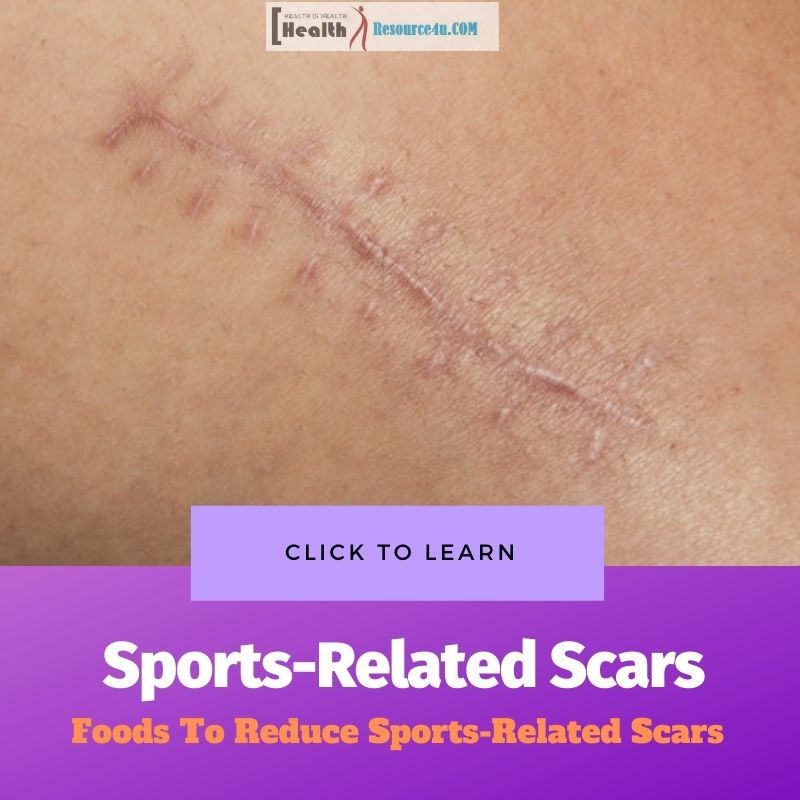Sports-related scars are quite common in the field of fitness, especially in high-intensity sports that require a lot of explosive movements and contact with other contestants.
Unfortunately, people tend to ignore these injuries due to their small size or how unserious they look. However, improper healing could take place at the site of these injuries, which eventually leaves unappealing scars and increased scar tissue.
For this reason, we decided to share with you the top 10 compounds/foods that reduce sports-related scars.
10 foods that reduce sport-related scars
1.   Vitamin A
Vitamin A is a potent antioxidant that aids your skin to heal properly and prevent infectious and inflammatory processes. This compound also interferes with the production of collagen – a substance that mediates skin healing and scar formation.
Vitamin A-rich foods include dairy products, liver, fish, and fortified cereals.
Note that consuming excessive amounts of vitamin A could lead to adverse effects such as dizziness, nausea, arthralgia (i.e., joint pain), and recurrent headaches.
2.   Vitamin C
As we established in our other blog posts, vitamin C is essential for skin healing and collagen synthesis.
Multiple scientific studies found that supplementing your body with vitamin C or consuming vitamin c-rich foods accelerates wound healing and reduces the size of scars.
Vitamin C could also promote the proliferation of skin cells in the damaged areas, which eventually smoothens the scar and helps blend it with the surrounding tissue.
To get vitamin C, you can either consume foods rich in this compound, such as oranges, strawberries, peppers, and broccoli, or take dietary supplements.
According to the National Institutes of Health (NIH), the average person needs between 75–90 mg of vitamin C per day.
3.   Vitamin E
Vitamin E is one of the most potent naturally-occurring antioxidants that accelerate wound healing and aids in the process of scar formation.
By preventing the accumulation of reactive oxygen species and proinflammatory cytokines at the site of injury, vitamin E is the perfect element to consume after a sports-related trauma.
Some foods that contain large amounts of vitamin E include sunflower seeds, avocados, and egg yolks.
4.   Iron
Iron is vital for hemoglobin production, which is a compound found in red blood cells that’s responsible for carrying oxygen.
As you may know, proper blood circulation to the area of injury is essential to supply the skin with the necessary substances to heal correctly. Therefore, if you are deficient in iron, you can expect your sports-related injuries to scar poorly.
Iron is commonly found in chicken, beef, tofu, lentils, and beans.
5.   Zinc
Zinc plays a role in the vast majority of cellular processes, including the immune reaction, tissue healing, and scar formation.
By interfering with protein synthesis, zinc established itself as the go-to mineral to promote wound healing and reduce sports-related scars.
Moreover, the immune-modulating properties of zinc allow it to prevent viral and bacterial infections at the site of injury, which is extremely beneficial since infections can worsen wound healing and expand the area of scarring.
You can find zinc in nuts, seeds, red meats, oysters, chicken, and fortified cereals.
6.   Protein
Protein is integral for wound healing and scar formation.
You see, after getting injured, the body needs to replace the dead tissue with scar tissue, which requires protein as a basic building block. A classic form of protein used in scar formation is collagen – a complex protein that interferes with everything related to the skin.
To provide your body with the necessary amino acids to build collagen and other important fibers, you need to consume protein-rich foods or take dietary supplements (e.g., collagen supplements).
Natural foods that have large quantities of amino acids are:
- Â Meats
- Poultry
- Â Fish
- Soybeans
- Â Eggs
- Â Greek yogurt
- Tofu
- Â Soy protein products
7.   Seafood
In addition to their high content in protein, seafood has other beneficial compounds such as omega-3 fatty acids, vitamins (A, E, C), and natural antioxidants.
This will help temper down the inflammation, improve wound healing, and reduce the size of scars after sports injuries (e.g., tendinitis, traumatic bone fractures, ligament sprains, muscle strains).
8.   Dairy products
Dairy products are rich in calcium and vitamin D, which are beneficial for injuries in the muscles and bones.
In one study, researchers found that supplying patients who underwent traumatic injuries with vitamin D and calcium resulted in better prognosis and improved tissue healing.
9.   Green leafy vegetables
Green leafy vegetables are rich in a wide range of vitamins and minerals that optimize wound healing and aid in the proper scarring of injuries.
Unfortunately, the amounts of these substances in vegetables do not meet the daily intake requirements, which is why it’s important to mix things up and include more food elements from our list.
10. Pumpkins
While unusual, pumpkins are compacted with enzymes, minerals, and acids that balance the skin’s pH, which eventually reduces sports-related scars and inflammation in the skin.
When combined with other foods, pumpkin exerts a synergetic effect on wound healing.
Takeaway message
Sports injuries are quite common in the field of fitness and can lead to large scars that need the proper nutrition plan to reduce their size and appearance.
As you probably noticed, each food listed above contains a certain vitamin or mineral that aids in reducing sports-related scars.
While these foods are truly beneficial for people who want to improve the size and appearance of their scars, using a comprehensive all in one supplement like WoundVite will optimize healing and reduce sports-related scars.

